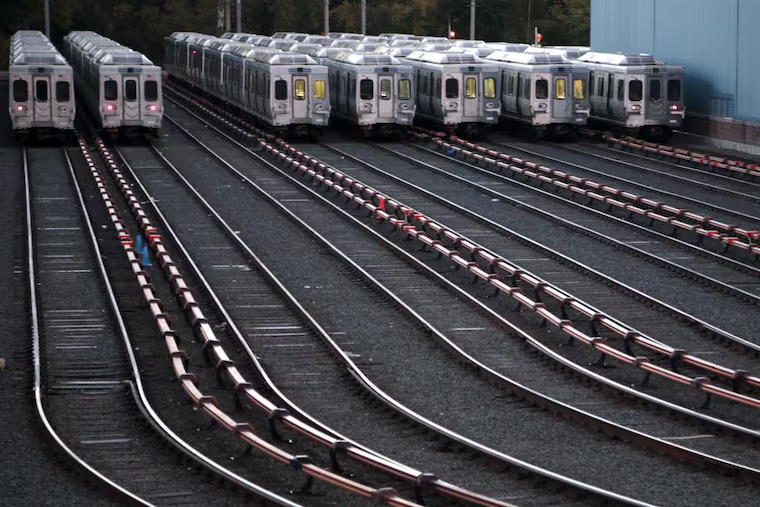Lawsuit challenging Pennsylvania’s transit funding dismissed
The decision removes some of the urgency from the transportation funding crisis Pennsylvania is facing.

A federal judge on Thursday dismissed a lawsuit that could have cost Pennsylvania hundreds of millions of dollars a year in transportation funding.
Transit agencies had been anxiously awaiting the decision from U.S. District Judge Yvette Kane. Had the suit been successful, the state stood to abruptly lose a vital source of transportation funding. As Pennsylvania nears the end of its fiscal year in June, though, the absence of a decision was becoming almost as concerning. Without a ruling, the Pennsylvania Turnpike Commission, the primary defendant, would have been unable to raise money to make needed payments to the state.
“We are pleased that the lawsuit against the turnpike that threatened SEPTA’s capital funding has been dismissed," said Pasquale “Pat” Deon, SEPTA’s board chairman and, as a board member of the Turnpike Commission, a defendant in the suit. “The investments the state has made in transportation infrastructure have proven to pay dividends by driving economic growth in Southeast Pennsylvania and throughout the commonwealth.”
One of the primary plaintiffs in the case, Owner-Operator Independent Drivers Association Inc.. which represents professional truck drivers, intends to appeal the decision, according to a statement Thursday.
The suit filed in March 2018 complained that Pennsylvania Turnpike tolls were so onerous they inhibited interstate commerce and travel. It challenged the use of toll money — about $450 million a year — to fund public transportation. The suit contended that the cost of tolls was in part driven by the turnpike’s obligation to provide money to public transportation, and that turnpike users were paying for projects beyond the highway itself.
In her 56-page ruling, Kane determined that there was good cause to complain that the turnpike’s toll structure disproportionately burdens drivers who don’t benefit from the public transportation for which their toll money pays. It costs a car with E-ZPass $36.20 to travel the length of the Pennsylvania Turnpike. A truck weighing from 30,001 to 45,000 pounds pays three times that.
That burden, though, didn’t constitute an illegal barrier to interstate commerce, Kane decided, because the cost of the tolls was the same whether the trucker was from out of state or from Pennsylvania. She also was not persuaded by an argument that the tolls constituted a barrier to interstate travel, since there were alternative routes a driver could use to get in and out of Pennsylvania.
The judge relied on older decisions, rather than decisions related to user fees that the truckers’ association hoped would be more supportive of their arguments, said Todd Spencer, the organization’s president, in a statement Thursday.
“This lawsuit is far from over,” Spencer said. “And win or lose on appeal, the turnpike’s debt crisis and the Commonwealth’s transportation emergency aren’t going away either. This is a crisis created by the legislature’s decisions, not our lawsuit.”
In its own statement, PennDot agreed that the cost of tolls had become untenable, and the decision Thursday didn’t resolve the state’s larger problems funding transportation.
“Turnpike tolls are too high,” said Erin Waters-Trasatt, a spokesperson for PennDot, “and current funding levels will not allow us to develop new projects or address the full portfolio of needed repairs.”
The turnpike commission’s chief executive, Mark Compton, also said in the statement that the decision didn’t eliminate the state’s problems funding transportation, it merely delayed a coming reckoning. Pennsylvania turned to turnpike tolls as a way to fund public transportation in a law passed in 2007, Act 44. That law was written with the intention that I-80 would be tolled, a plan that was shot down by federal authorities in 2010. Since then, the Turnpike Authority has had to borrow money to make the public transportation payments, which has contributed $6 billion to its debt.
“The decision does nothing to ease the burden that a decade of toll increases have taken on our customers’ pocketbooks,” Compton said.
The pending lawsuit made it impossible for the commission to borrow money to make its quarterly payments to PennDot for public transportation. PennDot has been partially making up the difference with money from its own budget. Those payments, worth about $337.5 million, will be made up by the end of the year, Compton said. The next payment is due at the end of April.
Act 89, passed in 2012, said the turnpike’s annual payments would be reduced to $50 million in 2022, leaving legislators with a challenge to find the equivalent amount, at least, by that year. A report from a panel of Southeastern Pennsylvania officials and business leaders released this week proposed dozens of possible solutions, ranging from new or higher taxes, higher fares on public transit, and new zoning regulations that would create revenue from public land.
SEPTA depends on the toll revenue for almost a third of its $750 million capital budget. The state’s transportation secretary, Leslie S. Richards, had said the suit’s success could have threatened transportation services for disabled and elderly riders statewide.
The largest recipients of annual payments from toll revenue are:
$232 million to SEPTA.
$76 million to the Port Authority of Allegheny County.
$8 million to $9 million to Amtrak for its Keystone and Pennsylvanian routes, which connect Philadelphia to New York City, Harrisburg, and Pittsburgh.
SEPTA had suspended almost 40 projects in the design and procurement stages and had said that if the suit was not resolved soon, it would have to cancel many of its construction projects already underway. SEPTA will resume work on the halted projects, a spokesperson said, though it was waiting for guidance from PennDot and the Turnpike Commission before determining the timing. SEPTA’s capital budget is estimated to be about $675 million in the coming fiscal year, with the turnpike revenue included.